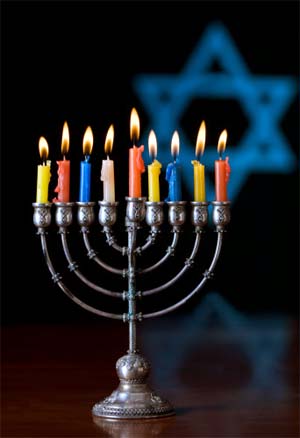Dec 15, 2025
Dec 15, 2025
 Shavuot, the 'Festival of Weeks', is the second of the three major festivals (Passover being the first and Sukkot the third), celebrating harvest season in Israel. Shavuot, which means 'weeks', refers to the timing of the festival, which is held exactly seven weeks after Passover (the 'Omer' period). The festival is known also as Yom Habikkurim (the Festival of the First Fruits), or the 'Day of the First Fruits', referring to the ancient custom in which the farmers of Israel would bring their first harvest to the Temple of Jerusalem as a token of thanksgiving. Shavuot, in addition, commemorates the giving of the Ten Commandments to the Israelites at Mount Sinai, and is also known as Hag Matan Torateinu (the Festival of the Giving of Our Torah).
Shavuot, the 'Festival of Weeks', is the second of the three major festivals (Passover being the first and Sukkot the third), celebrating harvest season in Israel. Shavuot, which means 'weeks', refers to the timing of the festival, which is held exactly seven weeks after Passover (the 'Omer' period). The festival is known also as Yom Habikkurim (the Festival of the First Fruits), or the 'Day of the First Fruits', referring to the ancient custom in which the farmers of Israel would bring their first harvest to the Temple of Jerusalem as a token of thanksgiving. Shavuot, in addition, commemorates the giving of the Ten Commandments to the Israelites at Mount Sinai, and is also known as Hag Matan Torateinu (the Festival of the Giving of Our Torah).
The festival marks the completion of the seven weeks between Passover and Shavuot during which the Jewish people prepared themselves for the giving of the Torah; in this period they cleansed themselves of the scars of slavery to enter into an eternal covenant with God to follow the laws laid down by Him. Shavuot also means 'oaths'; with the giving of the Torah, the Jewish people pledged not to forsake one another. The Jews believe that Passover freed them physically from bondage, but the giving of the Torah on Shavuot redeemed them spiritually from their bondage to idolatry.
The farmers of Israel would begin their spring harvests with the barley crop at Passover. The harvest continued for seven weeks as the other crops and fruits began to ripen. As each fruit ripened, the first of each type would not be eaten but instead the farmer would tie a ribbon around the branch. This ribbon signified that these fruits were Bikkurim, or the first fruits.
At Shavuot the farmers would gather the Bikkurim and bring them to the city of Jerusalem, where they would be eaten. The farmers living close to Jerusalem would bring fresh fruits, while those who had to travel a long distance carried dried raisins and figs. This joyful occasion was celebrated with the music of fifes, timbres, and drums. The Bikkurim ritual is no longer practiced in present day Israel.
Unlike most holidays, Shavuot has no unique laws to set it aside from the others. People are prohibited from doing work like on any other Yom Tov (holy day), but there are no requirements beyond that, unlike Pesach for example, with its special prohibition against chametz (fermented food).
Many of the traditions and customs of Shavuot have evolved from the legends and stories describing the experiences of the Israelites at Mount Sinai. According to tradition, the Israelites actually overslept on the day of Matan Torah (giving of Torah) and God had to awaken them himself. To compensate for this negligence, Jews hold a vigil on the eve of Shavuot. They stay awake from dusk to dawn, keeping themselves busy with the readings of the Torah and the Talmud. A digest of readings has evolved called Tikkun Leil Shavuot, the 'Restoration of Shavuot Eve', which includes selections from the Torah, the Prophets, the Talmud, and the Zohar' all scriptures.
It is also customary to eat a dairy meal at least once during Shavuot. There are varying opinions as to why this is done. Some say it is a reminder of the promise regarding the land of Israel: 'And He gave us this land, a land flowing with milk and honey.'
Another explanation comes from a legend stating that before the visit from God the Jews did not keep kosher or follow the Kashrut (dietary) laws. It was on this first Shavuot that they found out that their utensils were non-kosher and thus unfit for use. So finding themselves without kosher meats or utensils, the Israelites were forced to eat only dairy foods. Today, Jews celebrate Shavuot by eating blintzes, cheesecake, and other dairy dishes.
Another legend tells the story of the Israelites finding Mount Sinai blooming and lush with greenery and flowers. From this legend grew the custom to decorate the Jewish home and synagogue with tree branches and flowers. Some temples decorate the Torah scrolls with wreaths of roses.
It is said that before God gave the Torah to the Jewish people, He demanded guarantors. The Jews made a number of suggestions, all rejected by God, until they declared, 'Our children will be our guarantors that the Jewish people will cherish and observe the Torah'; God immediately accepted them and agreed to give the Torah. Thus it is enjoined upon every Jewish parent to ensure that the children attend service at the synagogue on Shavout.
It is noteworthy that the holiday is called the time of the giving of the Torah, rather than the time of the receiving of the Torah. The Jews believe that they are constantly in the process of receiving the Torah, but it was first given at this time. Thus it is the giving, not the receiving, that makes this holiday significant. Shavuot is also called Atzeret, meaning, The Completion, because together with Passover it forms the completion of a unit. The freedom gained on Passover became 'complete' on receiving the Torah on Shavuot.
12-Jul-2005
More by : Sujata Ashwarya Cheema